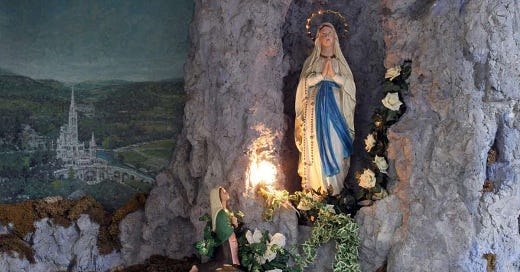Because World Day of the Sick falls on a Sunday, the Church will be celebrating it a day early this year. We’ll be attending the mass and anointing of the sick at the LA Cathedral, like we did last year. If you’d like to watch, it’ll be streaming at 12:30pm, pacific time.
Reading 1
1 Kgs 12:26-32; 13:33-34
Jeroboam thought to himself: "The kingdom will return to David's house. If now this people go up to offer sacrifices in the temple of the LORD in Jerusalem, the hearts of this people will return to their master, Rehoboam, king of Judah, and they will kill me."
After taking counsel, the king made two calves of gold and said to the people: "You have been going up to Jerusalem long enough. Here is your God, O Israel, who brought you up from the land of Egypt."
And he put one in Bethel, the other in Dan. This led to sin, because the people frequented those calves in Bethel and in Dan. He also built temples on the high places and made priests from among the people who were not Levites. Jeroboam established a feast in the eighth month on the fifteenth day of the month to duplicate in Bethel the pilgrimage feast of Judah, with sacrifices to the calves he had made; and he stationed in Bethel priests of the high places he had built.
Jeroboam did not give up his evil ways after this, but again made priests for the high places from among the common people. Whoever desired it was consecrated and became a priest of the high places. This was a sin on the part of the house of Jeroboam for which it was to be cut off and destroyed from the earth.
Jeroboam led a rebellion against a bad king, Solomon, but that doesn’t make him a good king. He screws up worse than Solomon ever did. Solomon allowed himself to be drawn into pagan cults, but Jeroboam was actively trying to bring the people away from God.
Why? Because his heart had actually converted to another religion? No, he was just afraid of being overthrown himself! It just goes to prove the old adage, no one is more afraid of theft than a thief, applies to usurpers, as well.
Responsorial Psalm
PS 106:6-7ab, 19-20, 21-22
R. Remember us, O Lord, as you favor your people.
We have sinned, we and our fathers;
we have committed crimes; we have done wrong.
Our fathers in Egypt
considered not your wonders.
R. Remember us, O Lord, as you favor your people.
They made a calf in Horeb
and adored a molten image;
They exchanged their glory
for the image of a grass-eating bullock.
R. Remember us, O Lord, as you favor your people.
They forgot the God who had saved them,
who had done great deeds in Egypt,
Wondrous deeds in the land of Ham,
terrible things at the Red Sea.
R. Remember us, O Lord, as you favor your people.
This psalm shows us that history keeps repeating itself. The people under Jeroboam definitely know about the golden calf at Horeb, and yet they still bowed down to the new golden calves in Bethel and Dan. It seems we just can’t learn our lesson.
Alleluia
Mt 4:4b
R. Alleluia, alleluia.
One does not live on bread alone,
but on every word that comes forth from the mouth of God.
R. Alleluia, alleluia.
Notice the word “alone.” God made us with bodies as well as souls, and knows that we need to feed both.
Gospel
Mk 8:1-10
In those days when there again was a great crowd without anything to eat, Jesus summoned the disciples and said, “My heart is moved with pity for the crowd, because they have been with me now for three days and have nothing to eat. If I send them away hungry to their homes, they will collapse on the way, and some of them have come a great distance.”
His disciples answered him, “Where can anyone get enough bread to satisfy them here in this deserted place?”
Still he asked them, “How many loaves do you have?”
They replied, “Seven.”
He ordered the crowd to sit down on the ground. Then, taking the seven loaves he gave thanks, broke them, and gave them to his disciples to distribute, and they distributed them to the crowd. They also had a few fish. He said the blessing over them and ordered them distributed also. They ate and were satisfied. They picked up the fragments left over–seven baskets. There were about four thousand people.
He dismissed the crowd and got into the boat with his disciples and came to the region of Dalmanutha.
The feeding of the five thousand is the only public miracle recorded in all four Gospels. There are details which are different, however; Matthew doesn’t mention dividing the fish, for example. It’s because breaking the bread is what’s important—it’s a sign of the eucharistic meal to come.



